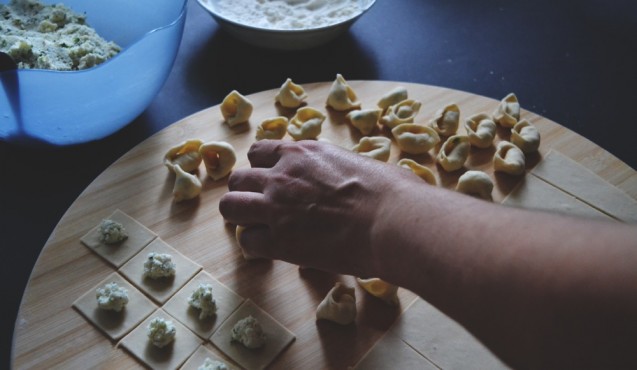12 Things I Learned About Recruiting From ‘Chopped’

Courtesy of Food Network
Be honest for five seconds: The part of recruiting you hate most is turning people down.
I don’t like doing it either, but it has to be done. I think most recruiters and hiring managers feel the same way.
Early in my recruiting career, I realized I wasn’t very good at rejecting people and needed to improve.
“You wanted to get better at rejecting people?”
No, not exactly.
I wanted to learn a method of rejection that helped people instead of hurting them. This doesn’t mean you are “soft” – it means you care about people and understand how small the world is.
See, I don’t know what the future holds or when the tables will turn – and trust me, they will turn.
I remember thinking, “Who have I seen turn people down in a positive manner?”
Then it came to me: The judges of the show Chopped have an effective method for delivering bad news that actually helps people!
But it’s T.V. – and, worse, it’s reality T.V.!
I don’t care, because the more I study the show, the more I realize it has a lot to teach us about recruiting.
1. It’s a Competition
The chefs who win Chopped never forget this. You can be friendly. You can have fun. But only one person wins the competition.
Recruiting and hiring is a contest. The difference is that both the “contestants” and “judges” have the power to “chop” in this game.
Companies, recruiters, hiring managers, and candidates – take note. If you want to be fancy, you need to take your time – or fail. That is fine. The clock always stops, and then someone gets “chopped.”
2. The Contest Is Equal
Competing chefs are given the same basket of mystery ingredients, the same amount of time, and access to the same pantry. Whether you win or lose comes down to two factors: your decisions and your performance.
Sometimes, the mystery ingredient or challenge is very hard – like a good interview question. A challenge is never degrading to the contestant, and the best chef (or candidate) always finds a way to win. They win without complaints or excuses. They make smart decisions quickly.
3. The Recruiting Process Has Its Own ‘Ingredients’
There are ingredients in 
But I don’t focus on ingredients – I watch how each chef responds. The chef who makes a big deal out of one ingredient tends to struggle the most and fail.
Notice the chef who is quiet, who applies their skills and experience. They find a simple way to make something great from a mystery ingredient – even if it is spirulina.
4. The Judges
In the hiring process, the judges are the members of the interview team – skilled professionals from diverse backgrounds.
Judges challenge and expect a lot from each chef, but their decisions are based on clear criteria, stated rules, and the chef’s performance today.
Judges are experts who put themselves on the same level as the chef (or candidate). Great judges go as far as to put themselves in the contestants’ shoes. This helps them understand who really performed at a high level.
The best interviewers are personal and never degrade the candidates.
There are only three judges on Chopped. If the panel were larger, decisions would take too long. If there were fewer judges, personal preferences would show through and wrongly influence the selection of the chefs who move forward.
Assessment of each chef’s performance happens rapidly. Consensus is reached and decisions are made without hesitation.
5. Criteria
Rules and criteria for the competition are very clear.
Rules: “Three rounds, mandatory mystery ingredients. If your dish doesn’t cut it, you will be chopped.”
Contest criteria: “Creativity, presentation, and taste.”
As a chef, you know exactly how you will be measured.
Because the criteria for the competition is simple and clear, consensus is reached quickly and decisions are made in an instant.
A good interview process has clear rules and criteria, too. It remains a competition. Sound decisions can be made quickly and are a sign of an effective hiring process.
6. Feedback
The judges give real-time feedback while they are sampling a chef’s dish (or interviewing a candidate?). This is the most transparent interview process I have ever seen. Facial expressions, comments, and body language signal scores to the competing chefs.
There are times when critiqu
How the chef receives this feedback is critical. Their response can nearly predict a win or loss.
I don’t know if a hiring process should ever provide real-time feedback. Interviews require an investment from candidates and, at the minimum, should return gracious, constructive feedback.
Performers deserve and crave timely feedback – these are the results of the process and the return for their efforts.
7. The Recap
One judge dislikes a candidate, forgets a dish they executed well, or has a bad experience with their food. The recap between rounds – before the final decision – is key: It allows the panel to analyze the chef’s performance and scores to make the best decision.
A winner is always selected. The show never restarts.
Selection is the reason the recruiting process started. Every move and decision brings the competition closer to the end – selection.
8. When You Are Chopped…
The judge providing the feedback delivers it in an empathetic manner. They point out areas where you performed well in the competition before skillfully delivering the reason(s) you were chopped.
This should be how you tell people they did not get the job.
Sometimes, the chef argues or cries. My favorite chefs have the best responses: “It’s been an honor to cook for you.”
Do you think they think about the public thrashing they took again?
I do.
Some learn from this skillful constructive rejection, improve, and try again. It helps them, – if they let it. The chef who leaves the competition with a reply like “You made the wrong decision” or “I stand by my dish” delays their own success.
9. Failure Is Not Final
If you lose Chopped your future is not decided. You competed and did not win. Failure is not final. Contestants go on to win other competitions or compete in other T.V. shows. Others return to Chopped – and win.
The most important thing about failing is to learn and try again. You cannot win if you do not try again.
10. Gratitude
Watch the host, Ted Allen, and the judges closely as they tell a chef they have been chopped. The next words out of their mouths are always impressive: “Thank you for sharing your work with us” or “Be well.”
Sometimes the losing
I know these people.
Not personally, but I know these chefs and the judges are destined to be winners (if they are not already). Their character and behavior in difficult situations wills them to win.
11. The Best Judges and Chefs Are Personal and Professional
They care about the people in front of them. Your story, why you compete, and what inspires you, is as important to them as your culinary skills. You can learn something from every person you meet.
Character drives their interactions. If something goes the wrong way, they injure themselves, or a chef or judge makes a comment they do not agree with, their character is still in control.
Even when they lose.
12. What About the Judge or Chef Who Is Kind of a … ?
Reality T.V. is not real – but recruiting is real life.
Whether you are a candidate, interviewer, or recruiter, there are times when a person is rude or rubs you the wrong way. Your response is determined by your character and learned skills. Don’t forget that.
–
Anyone can win.
Not everyone will win today.
Ego doesn’t make you the best or a winner.
Learned skills can outperform talent, experience, or alma mater.
Character always shows.
Find one thing to learn that you might need tomorrow.

